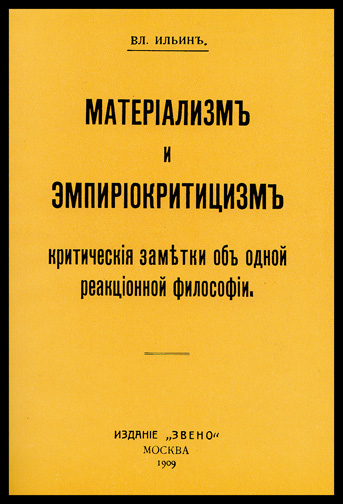|
Philosophy In The Soviet Union
Philosophy in the Soviet Union was officially confined to Marxist–Leninist thinking, which theoretically was the basis of objective and ultimate philosophical truth. During the 1920s and 1930s, other tendencies of Russian thought were repressed (many philosophers emigrated, others were expelled). Joseph Stalin enacted a decree in 1931 identifying dialectical materialism with Marxism–Leninism, making it the official philosophy which would be enforced in all Communist states and, through the Comintern, in most Communist parties. Following the traditional use in the Second International, opponents would be labeled as " revisionists". From the beginning of Bolshevik regime, the aim of official Soviet philosophy (which was taught as an obligatory subject for every course), was the theoretical justification of Communist ideas. For this reason, " Sovietologists", among whom the most famous were Józef Maria Bocheński, professor of philosophy at the Pontifical University of Saint Tho ... [...More Info...] [...Related Items...] OR: [Wikipedia] [Google] [Baidu] |
Marxist–Leninist
Marxism is a left-wing to far-left method of socioeconomic analysis that uses a materialist interpretation of historical development, better known as historical materialism, to understand class relations and social conflict and a dialectical perspective to view social transformation. It originates from the works of 19th-century German philosophers Karl Marx and Friedrich Engels. As Marxism has developed over time into various branches and schools of thought, no single, definitive Marxist theory exists. In addition to the schools of thought which emphasize or modify elements of classical Marxism, various Marxian concepts have been incorporated and adapted into a diverse array of social theories leading to widely varying conclusions. Alongside Marx's critique of political economy, the defining characteristics of Marxism have often been described using the terms dialectical materialism and historical materialism, though these terms were coined after Marx's death and their ... [...More Info...] [...Related Items...] OR: [Wikipedia] [Google] [Baidu] |
Western Philosophy
Western philosophy encompasses the philosophical thought and work of the Western world. Historically, the term refers to the philosophical thinking of Western culture, beginning with the ancient Greek philosophy of the pre-Socratics. The word ''philosophy'' itself originated from the Ancient Greek (φιλοσοφία), literally, "the love of wisdom" grc, φιλεῖν , "to love" and σοφία '' sophía'', "wisdom"). History Ancient The scope of ancient Western philosophy included the problems of philosophy as they are understood today; but it also included many other disciplines, such as pure mathematics and natural sciences such as physics, astronomy, and biology (Aristotle, for example, wrote on all of these topics). Pre-Socratics The pre-Socratic philosophers were interested in cosmology; the nature and origin of the universe, while rejecting mythical answers to such questions. They were specifically interested in the (the cause or first principle) of the ... [...More Info...] [...Related Items...] OR: [Wikipedia] [Google] [Baidu] |
Hermann Von Helmholtz
Hermann Ludwig Ferdinand von Helmholtz (31 August 1821 – 8 September 1894) was a German physicist and physician who made significant contributions in several scientific fields, particularly hydrodynamic stability. The Helmholtz Association, the largest German association of research institutions, is named in his honor. In the fields of physiology and psychology, Helmholtz is known for his mathematics concerning the eye, theories of vision, ideas on the visual perception of space, color vision research, the sensation of tone, perceptions of sound, and empiricism in the physiology of perception. In physics, he is known for his theories on the conservation of energy, work in electrodynamics, chemical thermodynamics, and on a mechanical foundation of thermodynamics. As a philosopher, he is known for his philosophy of science, ideas on the relation between the laws of perception and the laws of nature, the science of aesthetics, and ideas on the civilizing power of science. ... [...More Info...] [...Related Items...] OR: [Wikipedia] [Google] [Baidu] |
Evolutionism
Evolutionism is a term used (often derogatorily) to denote the theory of evolution. Its exact meaning has changed over time as the study of evolution has progressed. In the 19th century, it was used to describe the belief that organisms deliberately improved themselves through progressive inherited change (orthogenesis). The teleological belief went on to include cultural evolution and social evolution. In the 1970s, the term "Neo-Evolutionism" was used to describe the idea that "human beings sought to preserve a familiar style of life unless change was forced on them by factors that were beyond their control." The term is most often used by creationists to describe adherence to the scientific consensus on evolution as equivalent to a secular religion. The term is very seldom used within the scientific community, since the scientific position on evolution is accepted by the overwhelming majority of scientists. Because evolutionary biology is the default scientific position, it is a ... [...More Info...] [...Related Items...] OR: [Wikipedia] [Google] [Baidu] |
Class Struggle
Class conflict, also referred to as class struggle and class warfare, is the political tension and economic antagonism that exists in society because of socio-economic competition among the social classes or between rich and poor. The forms of class conflict include direct violence such as wars for resources and cheap labor, assassinations or revolution; indirect violence such as deaths from poverty and starvation, illness and unsafe working conditions; and economic coercion such as the threat of unemployment or the withdrawal of investment capital (capital flight); or ideologically, by way of political literature. Additionally, political forms of class warfare include legal and illegal lobbying, and bribery of legislators. The social-class conflict can be direct, as in a dispute between labour and management such as an employer's industrial lockout of their employees in effort to weaken the bargaining power of the corresponding trade union; or indirect such as a workers' sl ... [...More Info...] [...Related Items...] OR: [Wikipedia] [Google] [Baidu] |
Historicity
Historicity is the historical actuality of persons and events, meaning the quality of being part of history instead of being a historical myth, legend, or fiction. The historicity of a claim about the past is its factual status. Historicity denotes historical actuality, authenticity, factuality and focuses on the true value of knowledge claims about the past. Some theoreticians characterize historicity as a dimension of all natural phenomena that take place in space and time. Other scholars characterize it as an attribute reserved to certain human occurrences, in agreement with the practice of historiography.Jones, Michael S.,Lucian Blaga, The Historical Phenomenon: An Excerpt from The Historical Being (2012). Faculty Publications and Presentations. Paper 1. Herbert Marcuse explained historicity as that which "defines history and thus distinguishes it from 'nature' or the 'economy'" and "signifies the meaning we intend when we say of something that is 'historical'." The ''Blackwe ... [...More Info...] [...Related Items...] OR: [Wikipedia] [Google] [Baidu] |
Hegelian Dialectic
Dialectic ( grc-gre, διαλεκτική, ''dialektikḗ''; related to dialogue; german: Dialektik), also known as the dialectical method, is a discourse between two or more people holding different points of view about a subject but wishing to establish the truth through reasoned argumentation. Dialectic resembles debate, but the concept excludes subjective elements such as emotional appeal and the modern pejorative sense of rhetoric. Dialectic may thus be contrasted with both the eristic, which refers to argument that aims to successfully dispute another's argument (rather than searching for truth), and the didactic method, wherein one side of the conversation teaches the other. Dialectic is alternatively known as ''minor logic'', as opposed to ''major logic'' or critique. Within Hegelianism, the word ''dialectic'' has the specialised meaning of a contradiction between ideas that serves as the determining factor in their relationship. Dialectical materialism, a theory ... [...More Info...] [...Related Items...] OR: [Wikipedia] [Google] [Baidu] |
Materialism And Empirio-criticism
''Materialism and Empirio-criticism'' (Russian: ''Материализм и эмпириокритицизм, Materializm i empiriokrititsizm'') is a philosophical work by Vladimir Lenin, published in 1909. It was an obligatory subject of study in all institutions of higher education in the Soviet Union, as a seminal work of dialectical materialism, a part of the curriculum called "Marxist–Leninist Philosophy". Lenin argued that human perceptions correctly and accurately reflect an objective external world. Lenin formulates the fundamental philosophical contradiction between idealism and materialism as follows: "Materialism is the recognition of 'objects in themselves' or objects outside the mind; the ideas and sensations are copies or images of these objects. The opposite doctrine (idealism) says: the objects do not exist, outside the mind '; they are 'connections of sensations'."W. I. Lenin: '' Materialism and empirio-criticism. Critical remarks about a reactionary philosophy ... [...More Info...] [...Related Items...] OR: [Wikipedia] [Google] [Baidu] |
Vladimir Lenin
Vladimir Ilyich Ulyanov. ( 1870 – 21 January 1924), better known as Vladimir Lenin,. was a Russian revolutionary, politician, and political theorist. He served as the first and founding head of government of Soviet Russia from 1917 to 1924 and of the Soviet Union from 1922 to 1924. Under his administration, Russia, and later the Soviet Union, became a one-party socialist state governed by the Communist Party. Ideologically a Marxist, his developments to the ideology are called Leninism. Born to an upper-middle-class family in Simbirsk, Lenin embraced revolutionary socialist politics following his brother's 1887 execution. Expelled from Kazan Imperial University for participating in protests against the Russian Empire's Tsarist government, he devoted the following years to a law degree. He moved to Saint Petersburg in 1893 and became a senior Marxist activist. In 1897, he was arrested for sedition and exiled to Shushenskoye in Siberia for three years, where he married ... [...More Info...] [...Related Items...] OR: [Wikipedia] [Google] [Baidu] |
Anti-Dühring
''Anti-Dühring'' (german: Herrn Eugen Dührings Umwälzung der Wissenschaft, "Herr Eugen Dühring's Revolution in Science") is a book by Friedrich Engels, first published in German in 1878. It had previously been serialised in the newspaper ''Vorwärts.'' There were two further German editions in Engels' lifetime. ''Anti-Dühring'' was first published in English translation in 1907. Contents This work was Engels's major contribution to the exposition and development of Marxist theory. Its full title translates as ''Herr Eugen Dühring's Revolution in Science'': this is meant ironically and polemically. The short title recalls Julius Caesar's polemic '' Anti-Cato''. Eugen Dühring had produced his own version of socialism, intended as a replacement for Marxism. Since Karl Marx was busy at the time with writing ''Das Kapital'', it was left to Engels to write a general defence. The sections are ''Philosophy'', ''Political Economy'' and ''Socialism''. Among Communists, it is a p ... [...More Info...] [...Related Items...] OR: [Wikipedia] [Google] [Baidu] |
Karl Marx
Karl Heinrich Marx (; 5 May 1818 – 14 March 1883) was a German philosopher, economist, historian, sociologist, political theorist, journalist, critic of political economy, and socialist revolutionary. His best-known titles are the 1848 pamphlet ''The Communist Manifesto'' and the four-volume (1867–1883). Marx's political and philosophical thought had enormous influence on subsequent intellectual, economic, and political history. His name has been used as an adjective, a noun, and a school of social theory. Born in Trier, Germany, Marx studied law and philosophy at the universities of Bonn and Berlin. He married German theatre critic and political activist Jenny von Westphalen in 1843. Due to his political publications, Marx became stateless and lived in exile with his wife and children in London for decades, where he continued to develop his thought in collaboration with German philosopher Friedrich Engels and publish his writings, researching in the British Mus ... [...More Info...] [...Related Items...] OR: [Wikipedia] [Google] [Baidu] |





